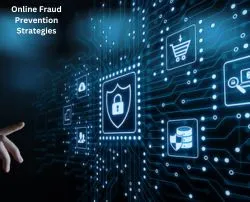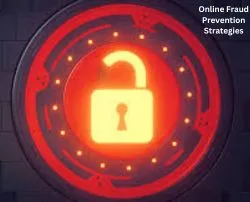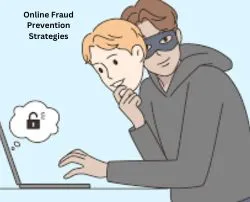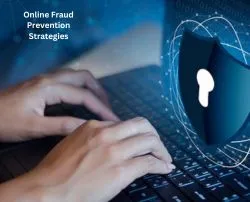Introduction
Online Fraud Prevention Strategies enter into the picture there. We are not merely listing and shaming the scams here: we are also preparing you with easy, practical steps to help you avert them in future like a professional.
You know, we all have at some point or another fallen prey to online fraud, so come on we know that there is no such thing as you being online (and you are obviously online) without being a victim at one point or another. It may be an email of a suspicious Nigerian prince, or a counterfeit bill of Amazon, but cybersecurity frauds are all around every scroll.
What is to bother about? As it has never been more dangerous in the online environment. And wonderful to relate, it is that Bad guys evolve more than ever.
What Are Cybersecurity Scams?

The Digital Minefield We All Navigate
And by those Congratulations, you win! typecasts that you likely, see? Or the 20th phone call that there is a virus in your computer? Ye, that is cyber-crime.
A cybersecurity scam is a type of digital fraud, a deception that may deprive you of your cash, your information or your identity. Online Fraud Prevention Strategies this is the important one.
Who Are the Common Targets?
It turns out it is everyone. It does not matter whether you are a teenager and you share memes, or you are a CEO, who checks email at lunch – no one is spared. Trust and distractions are not discriminated by the fraudsters. Online Fraud Prevention Strategies this is the important one.
Scammers Are Getting Smarter—And So Should We
What you are looking at is, with AI scams, the scariest thing. There are well-written emails, web sites are cloned to the pixel, even voices in the phone are not always human. Without our change with the right Online Fraud Prevention Strategies, we are sitting duck.
Scam 1: Phishing Attacks

What is Phishing?
Phishing is when a scammer pretends as an authoritative individual or company, like your bank or a service like Netflix, to get you to do something that robs you of some of your valuable information.
Phishing is when a scammer pretends as an authoritative individual or company, like your bank or a service like Netflix, to get you to do something that robs you of some of your valuable information.
Real-life Examples You Won’t Believe
- Your PayPal account is suspended- click to reactivate your account.
- Amazon refund request- log in again to recheck.
How realistic this appearance is? Here is how. That is the risk.
How to Avoid Phishing Scams
- Do not open links that you receive without being aware of the source of the link.
- Hover to find the real addresses of links.
- Always check the email address of the sender.
Online Fraud Prevention Strategies Against Phishing
- To use spam filters and AI-based email security solutions.
- Two factor authentication (2FA).
- Change your passwords frequently and ensure that they are advanced.
Scam 2: Tech Support Scams

The Fake Technician Trick
You are browsing the Internet and suddenly: your computer is infected. And in hastening to him He said, Call this number! That is frightening, isn’t?
You call. They need to be remote-accessed. You answer yes. They have got you now in charge of your machine.
Telltale Signs of a Tech Support Scam
- The unwanted technical support by means of phone calls or mails.
- Strategies of high pressure.
- Gift card and crypto requisition payment.
How to Stay Safe
- Do not call a number that has been shown as a pop-up.
- The real techie does not call you.
Online Fraud Prevention Strategies for Tech Support Scams
- Block the bad adverts using an ad blocker.
- Remote access tools should be marked with Wi-Fi reliable antivirus.
- Relatives to be trained- they are the victims of such scams.
Scam 3: Ransomware Attacks

What Happens in a Ransomware Attack?
Digital kidnapping: This is where hackers steal what you possess, mix it in a blender, and hold it ransom until you pay them some cash.
Businesses vs. Individuals – Who Gets Hit?
All of them are targets. students and hospitals are not safe. You are assuming that you are not big enough to be hacked? Think again.
Avoiding the Trap
- Do not download files of suspicious origin.
- Do not open suspect attachment.
- Get used to data backup.
Online Fraud Prevention Strategies for Ransomware
- Install automatic upgrades in operating systems and applications.
- Install high grade anti-virus software.
- Encrypted cloud backups should contain sensitive information.
Scam 4: Fake E-Commerce Websites

The Trap of the “Too Good to Be True” Deal
A 49-dollar iPhone? Sounds amazing, does it not? Wake up-fall.
How These Sites Look Legit
They utilize the use of real product images, fake testimonials and even imitating logos of popular brands.
Spotting the Red Flags
- There is no HTTPS on the URL.
- Mistakes in grammar and bad spelling.
- Minimal contact information/ fake customer service.
Online Fraud Prevention Strategies for Shopping Scams
- Buy only in authorized locations.
- Use credit cards or virtual debit cards so as to have an added security.
- Read the third-party reviews and not on-site ones.
Scam 5: Social Media Impersonation

The Friend Who Isn’t Your Friend
Hey, Let me borrow money in Paytm.
It is not your friend and it is a fraudster with his/her name and photo.
Social Engineering and Emotional Manipulation
Bad guys play around with your emotions: hurry, anxiety, compassion. they will write to you like they are your friends.
Protecting Your Online Identity
- Then, the privacy settings should be locked.
- Please do not share your personal information with strangers.
Online Fraud Prevention Strategies on Social Media
- Turn the two-step logging on.
- Report non genuine account as soon as possible.
- Check A message, either in person or by the phone, because it does not feel right.
General Online Fraud Prevention Strategies That Work

Strong Password Hygiene
Use special and extended passwords with symbols. Don not reuses them. Online Fraud Prevention Strategies uses strong password.
Multi-Factor Authentication (MFA)
MFA will be used as a second lock, even in case of your password leak.
Regular Software Updates
Do not check the option of reminding you later. Any patch seals an available vulnerability to hackers. Online Fraud Prevention Strategies check the software updates.
Cyber Awareness Training
Educate, your children, parents and part. Your greatest weak point is awareness creation.
The Psychology Behind Scams

Why Smart People Still Fall for Scams
Scammers, because they play with the human mind like the fiddle. They know how to push the buttons, by terror, by necessity, even by compliment. Online Fraud Prevention Strategies helps in scams.
Fear, Urgency, Greed – The Tools of the Trade
At a point where one has the perception that it is hurried or it is excessively good, hit the pause button. Take a moment off, fraudsters would like you to be quick. Online Fraud Prevention Strategies help the tools of the Trade.
Tools & Resources for Everyday Users
Browser Extensions & Email Filters
- uBlock Origin – malicious advertisement blocker.
- Mail Washer or Spamihilator – filters doubtful mails.
Antivirus & VPNs
- Antivirus: use Bitdefender, Norton or Kaspersky.
- One can even privately browse using Nord VPN or Proton VPN.
Where to Report Scams
- India:gov.in
- US:ftc.gov
Conclusion
Not only are frauds on your nerves; they are harmful. But you are not another victim any longer, but are educated. That will be your first line defence, and that will provide you with the defensive first line and first line offence.
Always remember that every single click is a choice. Choose one that is right.
These are the Online Fraud Prevention Strategies that you need to undertake now and continue doing so all the time ahead of the online fraudsters.
FAQs
1. What is the most common cybersecurity scam today?
Phishing is probably the most popular trick because it is extremely easy and effective.
2. How do I teach my kids or parents about online fraud prevention?
Use real life examples, use them with red flags and apply parental controls or apps block.
3. Can antivirus software really stop phishing or ransomware?
It helps; the greatest one is awareness. These are just some of the tools which make up your offensive and defensive system.
4. Are public Wi-Fi networks safe for banking or shopping?
Not really. You should only use VPN when you are not in a position to avoid it.
5. What should I do immediately after falling for a scam?
Do not use the same password again and contact your bank and file a complaint on cybercrime.gov.in or any other relevant official.






